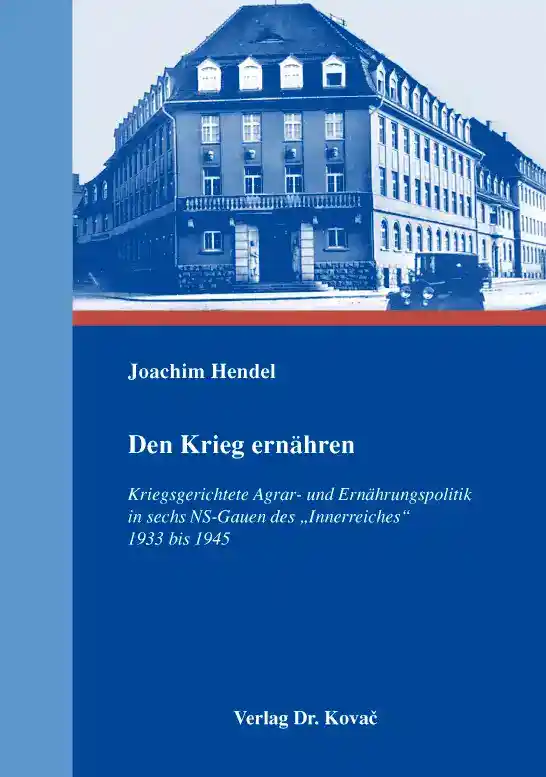Joachim HendelDen Krieg ernähren
Kriegsgerichtete Agrar- und Ernährungspolitik in sechs NS-Gauen des „Innerreiches“ 1933 bis 1945
Studien zur Geschichte des Nationalsozialismus, volume 2
Hamburg 2015, 488 pages
ISBN 978-3-8300-8215-6 (print) |ISBN 978-3-339-08215-2 (eBook)
Rezension
[...] Dank ihrer breiten Quellenbasis und eines souveränen Überblicks über den derzeitigen Forschungsstand wird Hendels Untersuchung auf längere Sicht maßgeblich bleiben. Ein Personen- und ein Ortsregister helfen bei der schnellen Orientierung.
About this book deutschenglish
The „blood and soil” myth no longer suffices to explain 12 years of NS regime and the dimension of a war of extermination lasting for a total of 6 years. The leaders of the „Third Empire” were convinced that a future war did not only require an efficient armaments policy but also a reconsideration of food policy to ensure food availability. However, agriculture has not been considered a „war-relevant type of business” until then. The NS system focused on „Blitzkrieg”, plundering, and rationing instead. Workers from the armament sector were lent to agriculture in peak periods only and even then with great reluctance; material and transport capacities were granted insufficiently. The thesis „Feed the war. War-directed agricultural policy and food politics in six Nazi Gaue of the „internal empire“ from 1933 to 1945” wants to contribute to research on the structural history of national socialism. Being part of the research project „The NS regions as mobilization structures for the war” (promoted by German Research Foundation from 2009 to 2012), it investigates the different mid-level authorities of the „Third Empire” and their ways of dealing with nutrition issues during the Second World War. Especially the Reichsnährstand participated in the preparations for war. Its hierarchical structure with country, district, and local farming communities greatly contributed to both the preparation and the realization of the war-directed food economy. At the end of August 1939, land food offices and their subordinate food agencies were founded. Both of them are the focus of this study. It proves that these special authorities were system-immanent and tremendously important for the Nazi regime's stability during the war. The geographic scope of the investigation includes six Gaue (regions): Thuringia, Saxony, Halle-Merseburg, Magdeburg-Anhalt, Kurmark / Mark Brandenburg, and Mecklenburg. Due to their strategically favorable location, they came to be major development zones of the armament economy and thus caused food availability issues to only be of minor interest. This resulted in serious resource conflicts. At the same time, agriculture was faced with rising expectations in just these regions. The NS Gaue were the only relevant and functioning structures in the war-directed system of the national socialism.Link des Autors
Keywords
1933-1945AgrarpolitikErnährungsamtGau MecklenburgLandesbauernschaftLand ThüringenMark BrandenburgNationalsozialismusNS-GauNSDAPProvinz SachsenReichsnährstandVerwaltungsgeschichteZweiter WeltkriegIhr Werk im Verlag Dr. Kovač

Möchten Sie Ihre wissenschaftliche Arbeit publizieren? Erfahren Sie mehr über unsere günstigen Konditionen und unseren Service für Autorinnen und Autoren.
